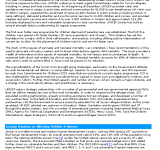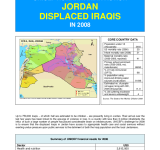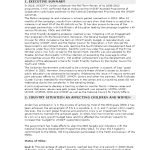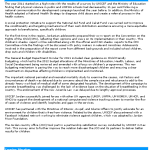والتعليم
The aim of the report is to identify the critical issues of the Iraqi refugees in 2008;; especially the vulnerable groups of children and women and their humanitarian needs. The report examines the lack of legal framework in Jordan to identify the status of Iraqi refugees and obtain quantitative information about them. Additionally;; it looks at other urgent issues including unemployment;; lack of access to education and health care and high level of post-traumatic stress syndrome among the refugees. The report summarizes key actions and achievements of the UNICEF in 2007. It also includes the organization’s plans for the humanitarian action in areas of health and nutrition;; education;; and child protection in the following year in response to the urgent issues.
The annual report provides an overview to the country situation in regards to children and women and summary of the humanitarian and developmental assistance of the UNICEF Jordan Country Office (JCO) in 2010. The report includes Jordan’s progress in achieving the Millennium Development Goals in addition to the analysis of the organization’s projects. The projects focus on assisting Iraqi children in education and strengthening young child survival and development and adolescents’ participation and empowerment. The analysis of the report is based on the progress and assessment of the JCO’s projects in partnership with other UN agencies;; local agencies and government ministries. Some highlights of the 2010 annual report include the Ma’An campaign to end violence in school;; the UNICEF’s partnership with the government in supporting Iraqi children in gaining access to public education and a joint programme to develop a tracking system to monitor family violence and abuse cases with other UN agencies and Jordan’s National Council for Family Affairs.
The UNICEF Syria Crisis is a series of bi-weekly report that provides a summary of the humanitarian situation in Syria and development of the organization’s projects in the regions including Syria;; Lebanon;; Jordan;; Iraq;; Turkey and Egypt. The report contains an overview to the changing situations and humanitarian needs of the crisis. It focuses on the results and progress of the UNICEF projects in partnership with other local agencies in each country. These projects aim to ensure sustained access to safe water and sanitation;; provide psychosocial support;; vaccination and school supplies for children and support camps and host community schools for increased school enrollment. Relevant figures that summarize and evaluate the development of ongoing programmes can also be found in the report.
The 2011 annual report provides a comprehensive summary of the ongoing projects by the UNICEF Jordan Country Office (JCO). The programmes and projects include social protection initiatives for the National Aid Fund and Zakat Fund;; national perinatal and neonatal mortality study and development of nationwide computerized violence tracking system. . The analysis of the report is based on the progress and assessment of the JCO’s projects in partnership with other organizations in relevant fields including the Ministries of Interior;; Awqaf and Islamic Affairs and other UN agencies (UNDP;; UNFPA;; UNWOMEN;; UNHCR and WHO). The report specifies the organization’s methodology in collecting data and evidence and monitoring mechanisms to track and assess programme progress. In evaluating the development of ongoing projects;; the report summarizes future work plans and examines critical factors and constraints in each project.
This report concerns the results of a survey on children’s literature and the promotion of reading in Palestine as represented by the West Bank and the Gaze Sector. Emphasis is placed on a number of axes regarding children’s literature;; including policies and legislation;; programs and institutions;; libraries;; elementary schools and universities;; and the publishing and distribution of children’s books. Upon analysis of the state of children’s literature in Palestine;; this report identifies certain trends regarding child culture. It also identifies a number of problems facing the promotion of reading among children;; including financial constraints;; the quality and availability of libraries;; and the overarching challenges influenced by Israel occupation.
In 2006;; the Sultanate of Oman undertook a project that aimed to support the implementation of the country’s vision towards conservation of biological diversity in the Sultanate of Oman. This report serves as an “evaluation and assessment of capacity building in the field of traditional knowledge related to biodiversity.” The report aims to describe the state of traditional knowledge on biodiversity in Oman;; assess capacity-building requirements in relation to traditional knowledge;; and provide a set of recommendations with a strategy for the protection and maintenance of traditional knowledge on biodiversity conservation. Various topics related to biodiversity are covered;; including irrigation;; tree cultivation;; crop improvement;; livestock management;; and soil and water conservation. The methodology used depends on three sources of information;; including a review of secondary data;; in-depth interviews;; and a participatory workshop.
This report surveys children’s literature in the Arab Republic of Egypt and the promotion of child literacy. The survey examines the promotion of children’s literature through various axis;; including official state policies;; the role of the private sector;; and the role of institutions and national programs in promoting child literacy. The report also examines Egypt’s childhood education system;; the quality and distribution of public libraries throughout Egypt;; and the nature of the publishing industry. Finally;; this report makes a number of recommendations which aim to further promote literacy among children in Egypt.







